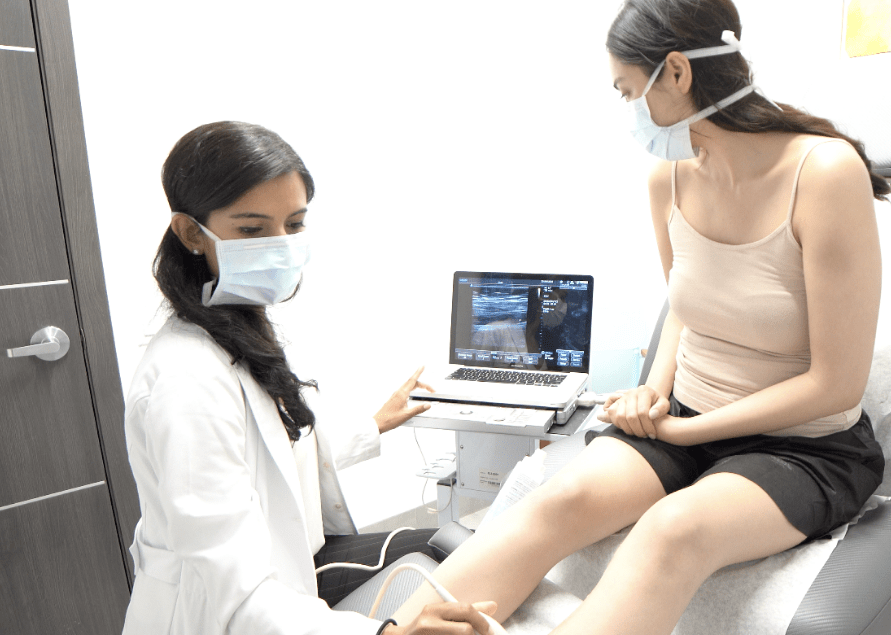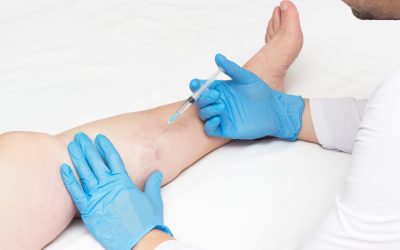Top Maryland Vein Doctors
How to Choose the Right Vein Treatment for Your Deep Vein Thrombosis
If you’re dealing with deep vein thrombosis (DVT), you’re likely looking for the most effective and appropriate treatment to address this potentially serious condition. Selecting the right vein treatment is crucial for your health and well-being. At Maryland Vein Treatment, we understand the importance of choosing the best treatment option for DVT. As board-certified vein doctors specializing in minimally invasive procedures, we are here to guide you through the decision-making process. In this comprehensive guide, we will walk you through the steps to ensure you choose the right vein treatment for your deep vein thrombosis.
What Is Deep Vein Thrombosis (DVT)?
DVT is a medical condition characterized by the formation of blood clots (thrombi) in the deep veins of the body, usually in the legs. These clots can block blood flow and pose a risk of severe complications, such as a pulmonary embolism (PE) if they break loose and travel to the lungs. The following are the signs and symptoms and potential complications of deep vein thrombosis:
- Swelling in the affected leg
- Pain or tenderness in the leg, often starting in the calf
- Warmth and redness over the affected area
- Visible veins on the skin’s surface
- Fatigue or discomfort in the leg, especially when standing or walking
- Skin discoloration, often appearing bluish or reddish
- Pulmonary embolism (PE), a life-threatening condition where a blood clot travels to the lungs
- Post-thrombotic syndrome (PTS), characterized by chronic leg pain and skin changes
- Recurrent DVT, with the risk of new blood clots forming in the veins
- Vein damage or scarring, which can affect blood flow in the affected limb
Diagnosis is the First Step
When dealing with DVT, the first crucial step in choosing the right vein treatment is obtaining an accurate diagnosis. At Maryland Vein Treatment, we prioritize diagnosing the root cause of your DVT before recommending any treatment options. This begins with a thorough evaluation, including a duplex ultrasound, which is a non-invasive imaging test that helps us identify the location and severity of the blood clot.
During duplex ultrasound, a specialized ultrasound device is used to create images of the veins and measure blood flow. It identifies the location, size, and severity of blood clots, enabling our vein specialists to formulate an accurate diagnosis and develop a personalized treatment plan tailored to your specific condition. The following are the benefits of duplex ultrasound:
- Non-invasive and painless procedure
- Provides real-time images and blood flow information
- Accurate diagnosis of deep vein thrombosis
- Diagnoses underlying conditions, such as chronic venous insufficiency
- Helps determine the severity and location of blood clots
- Guides personalized treatment planning
- Minimizes the need for more invasive tests
Consult a Vein Specialist
Now that you have your diagnosis, it’s time to consult a vein specialist. A vein specialist, also known as a vein doctor, is a medical professional with specialized training in diagnosing and treating venous conditions. When searching for a vein treatment doctor, it’s essential to consider their qualifications and expertise in dealing with DVT.
Qualifications of a Vein Treatment Doctor:
- Board Certification: Ensure that the vein doctor is board-certified in vascular medicine, which indicates they have met rigorous standards of education and experience in the field.
- Experience: Look for a vein specialist with substantial experience in diagnosing and treating DVT. Experience often translates to a better understanding of the condition and its nuances.
- Minimally Invasive Expertise: Given the advancements in vein treatments, it’s advisable to choose a vein doctor who specializes in minimally invasive procedures. These procedures are typically safer, less painful, and have shorter recovery times.
- Patient Reviews: Read reviews and testimonials from previous patients to gauge the doctor’s reputation and the quality of care they provide.
What to Ask a Vein Treatment Doctor:
- What are my treatment options for DVT? Ask the doctor to explain the available treatment options, including their pros and cons.
- Is minimally invasive treatment suitable for me? Inquire about whether you are a candidate for minimally invasive procedures, as they are often preferred for DVT.
- What is the success rate of the recommended treatment? Understanding the success rate can help you set realistic expectations for your treatment.
- What are the potential risks and complications? Make sure to be informed about any potential risks associated with the treatment.
- What is the expected recovery time? Knowing how long it will take to recover is essential for planning your post-treatment activities.

We know health insurance is confusing so we will help you check if you’re covered:
FREE Coverage Checker:
Consider the Treatment Options
Choosing the right vein treatment for your DVT should always be based on a personalized treatment plan. At Maryland Vein Treatment, we understand that every patient is unique, and their DVT requires an individualized approach. Your vein specialist will work closely with you to tailor a treatment plan that addresses your specific needs and takes into account factors such as your overall health, lifestyle, and the severity of your DVT.
Blood Thinners (Anticoagulants)
Blood thinners, or anticoagulants, are medications that help prevent the formation of new blood clots and the growth of existing ones. They are often the first-line treatment for DVT and can reduce the risk of complications, such as pulmonary embolism. Blood thinners can be administered orally or through injections.
Minimally Invasive Procedures
In recent years, minimally invasive procedures have become increasingly popular for treating DVT and its root cause. These procedures offer several advantages, including faster recovery and reduced discomfort. Some common minimally invasive treatments include:
- Endovenous Laser Ablation (EVLA): EVLA involves the use of laser energy to seal the affected vein, effectively closing off the clot and rerouting blood flow through healthier veins. This procedure is performed under local anesthesia and has a high success rate.
- Radiofrequency Ablation (RFA): RFA is a similar procedure to EVLA but uses radiofrequency energy instead of laser energy to close off the affected vein. It is also performed under local anesthesia and has proven to be highly effective.
- VenaSeal: VenaSeal is a unique approach to treating DVT that uses a medical adhesive to close the affected vein. This procedure is virtually painless and provides an immediate seal, allowing for a quick return to normal activities.
- Ambulatory Phlebectomy: Ambulatory phlebectomy is a minimally invasive procedure used to remove smaller varicose veins near the surface of the skin. This procedure is only recommended if you also have varicose veins, which often accompany DVT.
Compression Stockings
Compression stockings are a conservative treatment option for DVT. These specially designed stockings help improve blood circulation in the legs and reduce the risk of clot formation. While they may not be a standalone treatment for DVT, they are often recommended as part of a comprehensive management plan.

Visit Our Maryland Vein Treatment Center
Blood Tests and Monitoring
Your vein specialist may recommend regular blood tests to monitor your blood’s clotting ability while on anticoagulant medication. These tests help ensure that your medication dosage is appropriate and that your treatment remains effective.
Preventing Future Clots
In addition to choosing the right treatment for your current DVT, it’s crucial to take steps to prevent future clot formation. Your vein specialist will provide guidance on lifestyle changes and habits that can help reduce your risk of recurrence. Some preventive measures may include:
- Staying active and avoiding prolonged periods of inactivity
- Maintaining a healthy weight
- Wearing compression stockings as recommended
- Following your prescribed medication regimen, if on blood thinners
- Keeping regular follow-up appointments with your vein specialist for ongoing monitoring
Consult Our Vein Doctors in Maryland
Before starting any treatment, it’s essential to understand your insurance coverage. At Maryland Vein Treatment, we offer free insurance verification even before your first appointment. We want to ensure that you have a clear understanding of your insurance benefits and any potential out-of-pocket costs associated with your DVT treatment. Our goal is to make the financial aspect of your treatment as transparent and manageable as possible.
Choosing the right vein treatment for your deep vein thrombosis is a critical decision that should not be taken lightly. It involves a careful assessment of your condition, consultation with a qualified vein specialist, and consideration of the available treatment options. We are committed to helping you make an informed choice and providing the highest quality care for your DVT. Remember, early diagnosis and treatment are key to preventing complications from DVT, such as pulmonary embolism. Don’t hesitate to reach out to us at our conveniently located clinic at 10215 Fernwood Rd, Suite 301, Bethesda, Maryland, just outside of Washington, DC in Silver Spring, Maryland. Schedule your consultation today.



